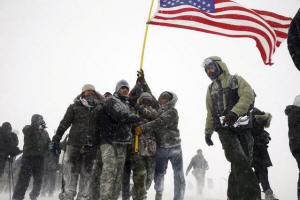|
For U.S. veterans, pipeline protest
promises to galvanize activism
 Send a link to a friend
Send a link to a friend
 [December 09, 2016]
By Ernest Scheyder and Terray Sylvester [December 09, 2016]
By Ernest Scheyder and Terray Sylvester
CANNON BALL/FORT YATES, N.D. (Reuters) -
U.S. veterans, thousands of whom last week helped stop a contested oil
pipeline running through North Dakota, could become important partners
of activists on the environment, the economy, race and other issues that
divide Americans.
Several academics said the effort to support the Standing Rock Sioux
tribe and others opposed to the pipeline project was likely the biggest
gathering of its kind of former military personnel since the early 1970s
when U.S. veterans marched against the Vietnam War.
That so many veterans mobilized in less than two weeks to rural North
Dakota speaks to the power they may have on public opinion, because of
their status as having put their lives on the line for their country,
veterans and academics said.
"The sense that vets are distinctively American figures, regardless of
political beliefs, always seems to have currency, even when they are
working on different sides of an issue," said Stephen Ortiz, a history
professor at the State University of Binghamton in New York.
Many veterans who went to Cannon Ball, North Dakota, to join the
months-long protests by Native Americans and environmentalists against
the 1,172-mile (1,885-km) Dakota Access Pipeline, said they were already
looking for their next issue to support.

"Militarily-trained soldiers have now discerned, on their own, a
genuine, just cause for which to promote and defend, and this time
without being under orders to do so," said Brian Willson, whose 2011
memoir "Blood on the Tracks: The Life and Times of S. Brian Willson",
described how after serving in the Vietnam War, he became a non-violent
protester for social change in the United States.
Law enforcement tactics, particularly the use of water cannons, against
the protesters had been considered extreme by some. Veterans said in
interviews they felt galvanized to act as a human shield, providing a
respite for those who had been at the protest camp for months.
The pipeline owned by Texas-based Energy Transfer Partners LP, is routed
adjacent to the Standing Rock Sioux's reservation. Protesters have said
the $3.8 billion project could contaminate the water supply and damage
sacred tribal lands.
The veterans at Standing Rock were led by former Marine Michael Wood Jr
and Army veteran Wes Clark Jr, son of retired U.S. general Wesley Clark,
former commander of NATO. The group raised $1.1 million through online
crowdfunding to help transport, house and feed veterans at the camp.
BATTLE RESUMES WITH TRUMP PRESIDENCY
On Sunday, the U.S. Army Corps of Engineers said it turned down a permit
for the pipeline's completion, handing a victory to the protesters.
But the saga will not end there. Republican President-elect Donald Trump
has said he wants the pipeline built; his team said he would review the
decision when he takes office.
Even though the fight is not over in North Dakota, some see this as a
way forward on other issues.
"There's a lot of these pipelines being built around the county. Flint
(Michigan) has a water crisis. So we're going to see if we can keep this
movement going and really change some things in America," said Matthew
Crane, 32, from Buffalo, New York, who served in the U.S. Navy from 2002
to 2006.
Clark's group, called Veterans Stand With Standing Rock (VSSR), asked
for 2,000 volunteers but said twice as many arrived. Comments on the
VSSR Facebook page criticized Clark for a lack of planning and for not
having contingencies in place for North Dakota's harsh winters.
[to top of second column] |

Veterans join activists in a march to Backwater Bridge just outside
of the Oceti Sakowin camp during a snow fall as "water protectors"
continue to demonstrate against plans to pass the Dakota Access
pipeline adjacent to the Standing Rock Indian Reservation, near
Cannon Ball, North Dakota, U.S., December 5, 2016. REUTERS/Lucas
Jackson

As a blizzard blew in on Monday, many hunkered down at the main
protest camp. Hundreds more slept in the pavilion of the Prairie
Knights Casino in Fort Yates, roughly 10 miles away on the Standing
Rock reservation.
Clark, who himself was snowed-in at the casino, said in a Facebook
video posted Wednesday night that the response meant "a huge tax on
the supply chain and on accommodations."
ASKING FORGIVENESS
As part of their journey to North Dakota, many veterans asked
forgiveness in two ceremonies for what they considered crimes and
mistreatment of Native Americans by the U.S. government and military
over the past 150 years.
One ceremony took place Monday on Backwater Bridge near the camp,
the site of two heated confrontations with law enforcement earlier
this fall. Thousands of veterans and tribal members prayed, emoting
war cries on the bridge's southern cusp.
One veteran, wearing a flak jacket and a Veterans for Peace flag,
yelled to the crowd from atop a horse.
"We didn't serve this country to see our brothers and sisters here
persecuted," said the man, whose name was inaudible in the fury of
the arriving blizzard. "Are we not all human?"
Some veterans said they planned to remain in North Dakota, unwilling
to trust that Energy Transfer Partners would abide by the federal
government's decision. Most had left by Wednesday, however, said
Heather O'Malley, a U.S. Army veteran who monitored news for the
group. She said it was unclear if they would return to the area in
January if needed.

Clark and others said this was a way for veterans to address other
efforts around the country.
"This is a small battleground in a larger war that is developing in
our country that has to do with race, the economy and the powers
that be taking advantage of those who really don't have a voice,"
said Anthony Murtha, 29, from Detroit, who served in the U.S. Navy
from 2009 to 2013.
(Reporting by Ernest Scheyder and Terray Sylvester in Cannon Ball
and Fort Yates, N.D.; additional reporting by Tim Mclaughlin and
Andrew Cullen; writing by David Gaffen; editing by Grant McCool)
[© 2016 Thomson Reuters. All rights
reserved.]
Copyright 2016 Reuters. All rights reserved. This material may not be published,
broadcast, rewritten or redistributed. |